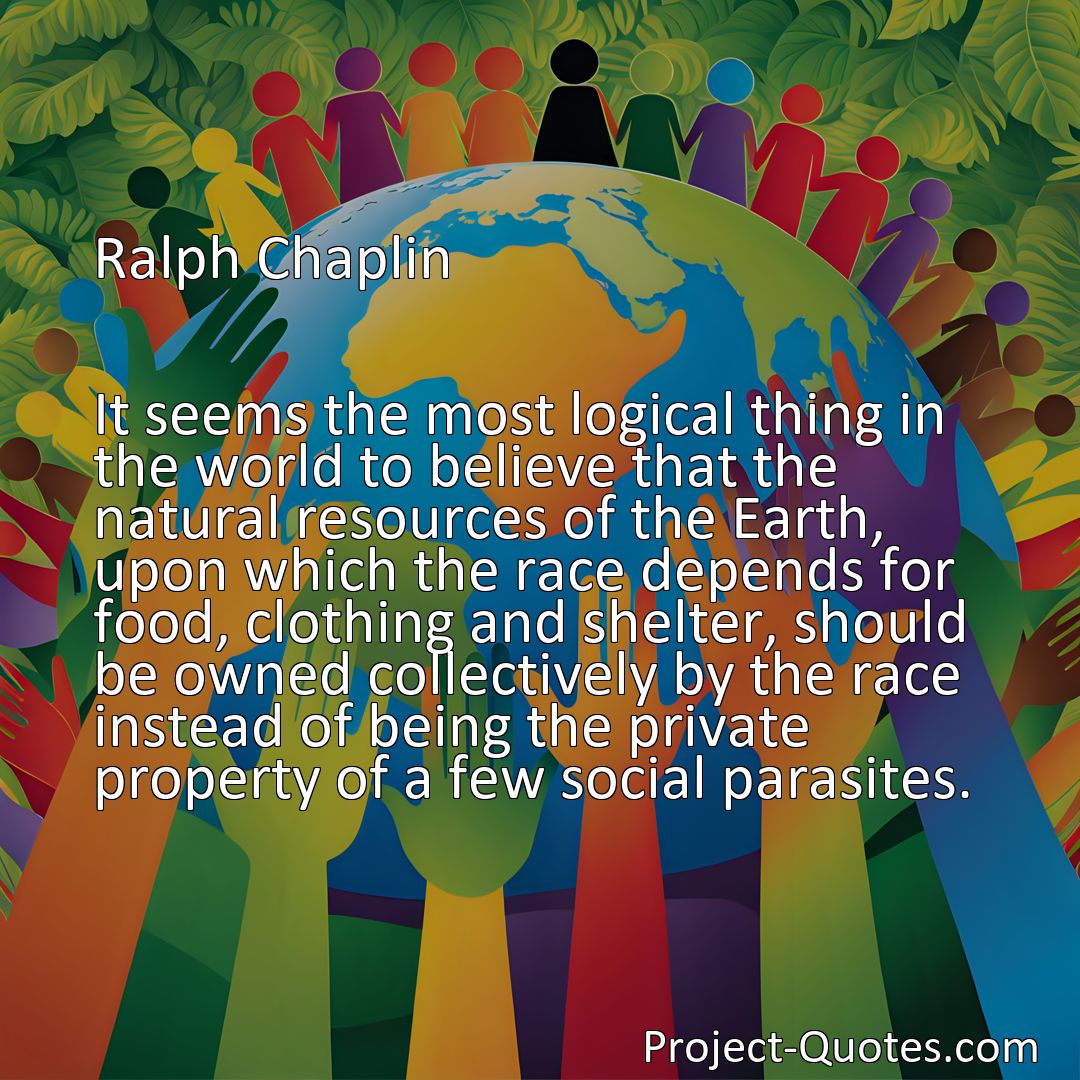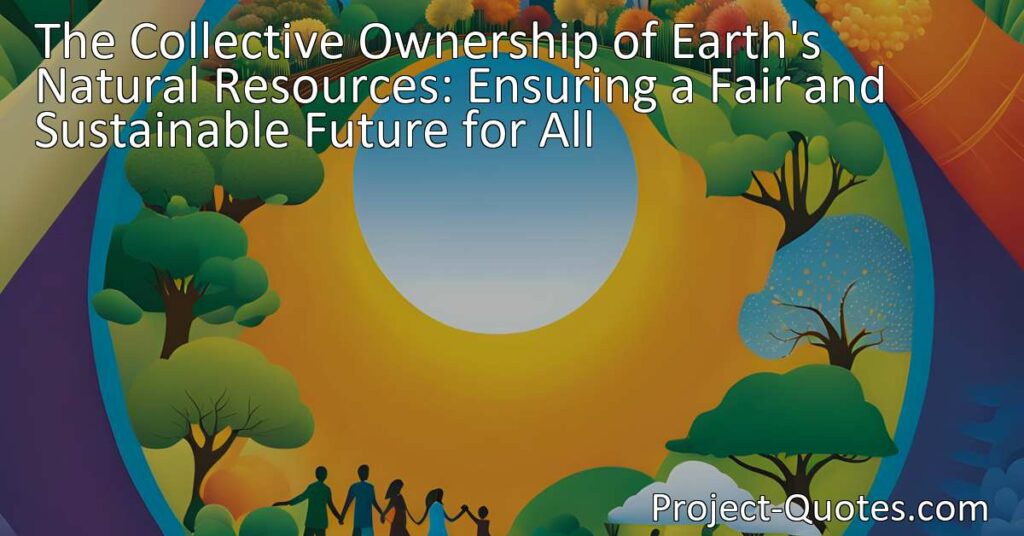Ralph Chaplin
The Collective Ownership of Earth’s Natural Resources: Ensuring a Fair and Sustainable Future for AllIn a world where resource distribution determines people’s well-being, it’s time to question the idea of private ownership. This essay explores the advantages, challenges, and implications of collective ownership of natural resources, highlighting the potential for equality, social justice, environmental stewardship, and fair resource allocation. Transitioning to collective ownership requires inclusive governance and economic incentives, but it offers the potential to create a more just and sustainable society for all.
Table of Contents
- 1 It seems the most logical thing in the world to believe that the natural resources of the Earth, upon which the race depends for food, clothing and shelter, should be owned collectively by the race instead of being the private property of a few social parasites.
- 2 Ralph Chaplin
- 3 Meaning of Quote – It seems the most logical thing in the world to believe that the natural resources of the Earth, upon which the race depends for food, clothing and shelter, should be owned collectively by the race instead of being the private property of a few social parasites.
- 4 Freely Shareable Quote Image
- 5 Related
The Collective Ownership of Earth’s Natural Resources: Ensuring a Fair and Sustainable Future for All
Introduction:
In today’s world, where the distribution of resources plays a crucial role in determining one’s standard of living, it becomes imperative to question the concept of private ownership of natural resources. As the quote suggests, shouldn’t these resources be collectively held and managed for the benefit of the entire human race rather than being monopolized by a privileged few? This essay will explore the idea of collective ownership of Earth’s natural resources and delve into its potential implications, advantages, and challenges. By exploring this topic, we hope to foster a deeper understanding of the importance of resource distribution for the well-being of society.
Understanding the Present Situation:
For centuries, a select few individuals or organizations have wielded control over vast amounts of natural resources, thereby accumulating immense wealth and power. This concentration of ownership raises ethical concerns, as it perpetuates social inequality and leaves countless others struggling to access basic necessities like food, clothing, and shelter. By collectively owning these resources, we can aim to create a society where everyone has a fair chance at a decent living.
Implications of Collective Ownership:
1. Equality and Social Justice:
The concept of collective ownership seeks to address the stark disparities between the haves and have-nots in our society. By redistributing the ownership of natural resources, we can ensure a more equitable distribution of wealth, providing an opportunity for everyone to access the resources necessary for survival. This would pave the way for a more just and inclusive society, reducing poverty and narrowing the wealth gap.
2. Environmental Stewardship:
When resources are privately owned, the pursuit of profit often overshadows sustainable practices. However, collective ownership presents an opportunity to approach resource exploitation with a greater emphasis on environmental preservation. By adopting sustainable methods, the collective owners can ensure the long-term availability of resources while taking steps to mitigate environmental degradation. This approach aligns with the urgent need to address climate change and protect biodiversity.
Advantages of Collective Ownership:
1. Resource Allocation:
In a system of collective ownership, resources can be allocated based on the principles of fairness and need. Instead of prioritizing profit generation, resource management can be guided by the aim of meeting essential needs first, particularly for the vulnerable segments of society. As a result, there will be a reduced risk of scarcity-induced conflicts and a higher likelihood of ensuring everyone’s well-being.
2. Innovation and Collaboration:
Collective ownership encourages collaboration, as decisions are made collectively and represent the interests of all stakeholders. Such collaboration opens doors for innovative solutions to resource management challenges. When diverse perspectives are considered, economies of scale can be achieved, and collective problem-solving can lead to more efficient resource utilization for the benefit of society.
Challenges and Considerations:
1. Governance and Decision-making:
Transitioning to a system of collective ownership would require robust governance structures focused on representing and involving all members of society. Balancing the varying needs and interests of a diverse population poses a significant challenge since decision-making in such a system must cater to the common good. Deliberative democratic processes should be adopted, ensuring inclusivity, transparency, and accountability to prevent power imbalances.
2. Economic Implications:
Critics argue that collective ownership can lead to a lack of economic incentives and individual motivation. They claim that the profit-driven private ownership system drives innovation, economic growth, and productivity. Yet, it is essential to recognize that collective ownership does not mean the absence of personal responsibility or rewards for initiative. Creative mechanisms can be developed to incentivize and reward individual contributions while ensuring the equitable distribution of benefits.
Conclusion:
As we reflect on the quote presented, it becomes clear that collective ownership of Earth’s natural resources offers a compelling alternative to the current system of private ownership. By transitioning toward this model, we can foster a fairer and more sustainable future for all. Redistributing resource ownership, with the aim of meeting societal needs and preserving the environment, holds the potential to create a just and equitable society. By utilizing deliberative democratic decision-making and developing mechanisms to encourage initiative and innovation, we can overcome the challenges associated with this transition. It is a collective effort that asks us to reevaluate our understanding of ownership and embrace a society in which resources are truly shared for the greater benefit of humanity.
I hope this quote inspired image brings you hope and peace. Share it with someone who needs it today!


